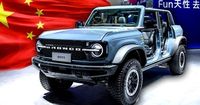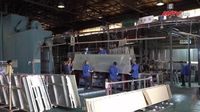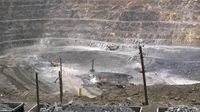Ford Motor Company has announced a temporary halt to the export of its vehicles to China, primarily due to the newly imposed tariffs on American-made cars. This decision impacts several of Ford's popular models, including the F-150 Raptor, Bronco, Mustang, and Lincoln Navigator. The move comes in the wake of China increasing tariffs on US-made vehicles by as much as 150%, a direct response to US tariffs on Chinese goods.
Last year, Ford sold approximately 400,000 vehicles in China, but this year has seen a significant drop, with only 5,500 vehicles imported from the US as of 2024. Despite the small market share, Ford's strategy included selling its hottest models to enhance its brand image, with the imported F-150 Raptor fetching prices as high as $100,000 in China.
While Ford has paused complete vehicle exports, it will continue to ship US-made engines and gearboxes to China. Conversely, Ford only imports the Lincoln Nautilus from China, which will still be brought into the US market despite the high tariffs. In light of the ongoing trade war, Ford is also contemplating price increases on certain new models in the US.
Currently, nearly 80% of Ford's products sold in the US are manufactured domestically, which helps the company avoid the 25% tariff imposed on imported vehicles. However, this does not exempt them from tariffs on parts produced overseas. A recent analysis by the Center for Automotive Research indicated that the Trump administration's 25% tariff on imported cars could increase costs for automakers by about $108 billion in 2025, although Trump has suggested he might consider exemptions.
In a related development, Beijing has imposed export restrictions on seven rare earth elements and critical magnets essential for electric vehicles, wind turbines, and fighter jets. This action is also a retaliation against the 145% tariff imposed by President Trump on Chinese goods. Industry experts have indicated that companies currently have enough reserves for approximately 3-6 months, but they will need to stockpile additional materials and seek alternative sources to avoid significant disruptions in their supply chains.
Jan Giese, a metals trader at Tradium, warned that many automakers and their suppliers might only have enough magnets on hand for 2-3 months. The recent restrictions from China focus on heavy and medium rare earths used to create high-performance magnets that can endure higher temperatures, including dysprosium, terbium, and samarium. These materials are crucial for military applications like jet fighters, missiles, and drones, as well as for rotors, engines, and gearboxes in electric and hybrid vehicles.
An automotive executive noted that China's export restrictions on these key minerals will have significant repercussions for Tesla and other car manufacturers. The executive remarked that this is a form of retaliation, suggesting that the Chinese government might be signaling that they will not respond to tariffs with more tariffs but will instead take actions that could harm US interests.
Although rare earth metals are not particularly hard to find in the Earth's crust, they are challenging to mine cost-effectively and in an environmentally friendly manner. China currently maintains a near monopoly on the processing of heavy rare earths. Cory Combs from the consultancy Trivium pointed out that "light" rare earths, such as neodymium and praseodymium, used extensively in magnets, were not included in the recent export controls. This leaves room for China to further tighten its export controls if the trade war escalates.
The new measures require exporters to obtain permits for each shipment of materials sold abroad and have expanded to prohibit re-exports to the US. China began controlling the export of key materials in 2023 in response to US restrictions on China's access to chip technology, and the recent limitations on rare earths and magnets are an extension of earlier measures.
Chinese exporters have declared force majeure for shipments of rare earths and magnets that were scheduled for export, causing these materials to be withdrawn from the market and complicating pricing. Meanwhile, Japan and other nations are hopeful that the stranglehold China has on heavy rare earths may ease through Australian company Lynas, which is expanding its processing facility in Malaysia to produce dysprosium and terbium by mid-2025.
However, experts warn that the reserves of heavy rare earth elements currently available are insufficient to prevent potential volatility in the automotive supply chain. The pressing question remains whether a new alternative supply chain can be established in time to avoid running out of these critical materials.
As of April 2, 2025, it remains unclear how Beijing intends to implement the latest export controls. These restrictions are being introduced amid a decline in heavy rare earth supplies due to ongoing conflicts in Myanmar, which suggests that limiting exports will help consolidate domestic supplies.
Analysts have noted that in recent years, China has been cautious about restricting exports of items that could negatively impact its own economic interests, such as gallium. However, other metals like antimony have faced export restrictions. The critical question now is how long it will take for China to issue export permits for shipments, which could have significant implications for global supply chains.






